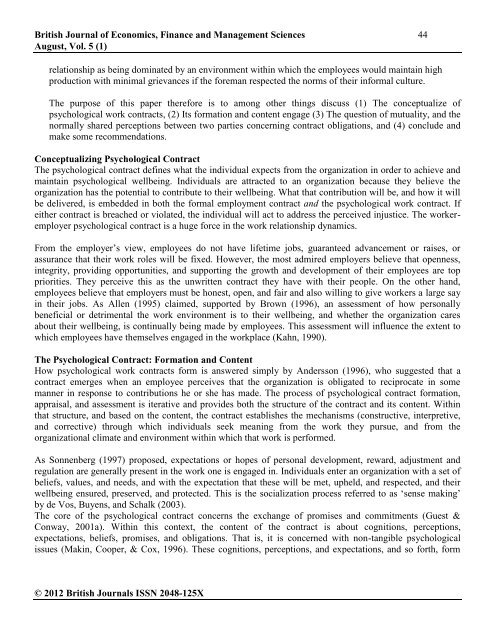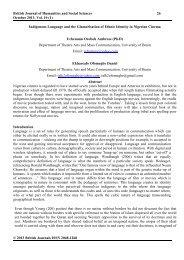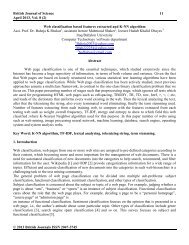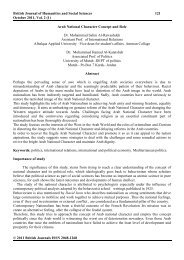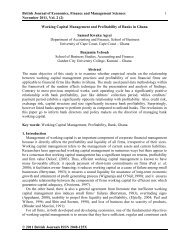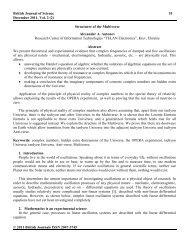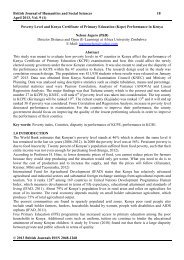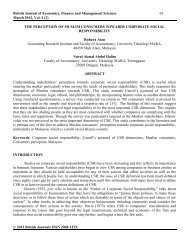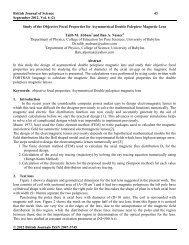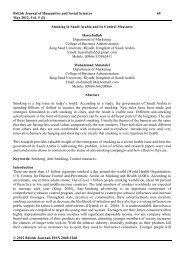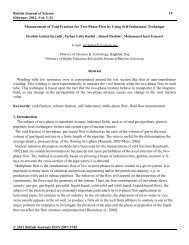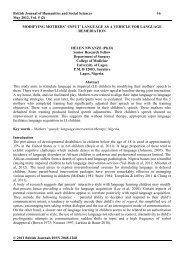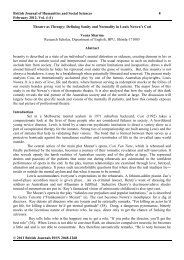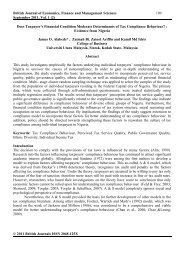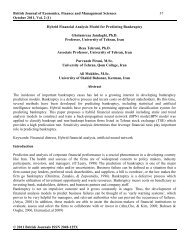Psychological Contract in Nigeria - British Journal of Science
Psychological Contract in Nigeria - British Journal of Science
Psychological Contract in Nigeria - British Journal of Science
Create successful ePaper yourself
Turn your PDF publications into a flip-book with our unique Google optimized e-Paper software.
<strong>British</strong> <strong>Journal</strong> <strong>of</strong> Economics, F<strong>in</strong>ance and Management <strong>Science</strong>s 44August, Vol. 5 (1)relationship as be<strong>in</strong>g dom<strong>in</strong>ated by an environment with<strong>in</strong> which the employees would ma<strong>in</strong>ta<strong>in</strong> highproduction with m<strong>in</strong>imal grievances if the foreman respected the norms <strong>of</strong> their <strong>in</strong>formal culture.The purpose <strong>of</strong> this paper therefore is to among other th<strong>in</strong>gs discuss (1) The conceptualize <strong>of</strong>psychological work contracts, (2) Its formation and content engage (3) The question <strong>of</strong> mutuality, and thenormally shared perceptions between two parties concern<strong>in</strong>g contract obligations, and (4) conclude andmake some recommendations.Conceptualiz<strong>in</strong>g <strong>Psychological</strong> <strong>Contract</strong>The psychological contract def<strong>in</strong>es what the <strong>in</strong>dividual expects from the organization <strong>in</strong> order to achieve andma<strong>in</strong>ta<strong>in</strong> psychological wellbe<strong>in</strong>g. Individuals are attracted to an organization because they believe theorganization has the potential to contribute to their wellbe<strong>in</strong>g. What that contribution will be, and how it willbe delivered, is embedded <strong>in</strong> both the formal employment contract and the psychological work contract. Ifeither contract is breached or violated, the <strong>in</strong>dividual will act to address the perceived <strong>in</strong>justice. The workeremployerpsychological contract is a huge force <strong>in</strong> the work relationship dynamics.From the employer’s view, employees do not have lifetime jobs, guaranteed advancement or raises, orassurance that their work roles will be fixed. However, the most admired employers believe that openness,<strong>in</strong>tegrity, provid<strong>in</strong>g opportunities, and support<strong>in</strong>g the growth and development <strong>of</strong> their employees are toppriorities. They perceive this as the unwritten contract they have with their people. On the other hand,employees believe that employers must be honest, open, and fair and also will<strong>in</strong>g to give workers a large say<strong>in</strong> their jobs. As Allen (1995) claimed, supported by Brown (1996), an assessment <strong>of</strong> how personallybeneficial or detrimental the work environment is to their wellbe<strong>in</strong>g, and whether the organization caresabout their wellbe<strong>in</strong>g, is cont<strong>in</strong>ually be<strong>in</strong>g made by employees. This assessment will <strong>in</strong>fluence the extent towhich employees have themselves engaged <strong>in</strong> the workplace (Kahn, 1990).The <strong>Psychological</strong> <strong>Contract</strong>: Formation and ContentHow psychological work contracts form is answered simply by Andersson (1996), who suggested that acontract emerges when an employee perceives that the organization is obligated to reciprocate <strong>in</strong> somemanner <strong>in</strong> response to contributions he or she has made. The process <strong>of</strong> psychological contract formation,appraisal, and assessment is iterative and provides both the structure <strong>of</strong> the contract and its content. With<strong>in</strong>that structure, and based on the content, the contract establishes the mechanisms (constructive, <strong>in</strong>terpretive,and corrective) through which <strong>in</strong>dividuals seek mean<strong>in</strong>g from the work they pursue, and from theorganizational climate and environment with<strong>in</strong> which that work is performed.As Sonnenberg (1997) proposed, expectations or hopes <strong>of</strong> personal development, reward, adjustment andregulation are generally present <strong>in</strong> the work one is engaged <strong>in</strong>. Individuals enter an organization with a set <strong>of</strong>beliefs, values, and needs, and with the expectation that these will be met, upheld, and respected, and theirwellbe<strong>in</strong>g ensured, preserved, and protected. This is the socialization process referred to as ‘sense mak<strong>in</strong>g’by de Vos, Buyens, and Schalk (2003).The core <strong>of</strong> the psychological contract concerns the exchange <strong>of</strong> promises and commitments (Guest &Conway, 2001a). With<strong>in</strong> this context, the content <strong>of</strong> the contract is about cognitions, perceptions,expectations, beliefs, promises, and obligations. That is, it is concerned with non-tangible psychologicalissues (Mak<strong>in</strong>, Cooper, & Cox, 1996). These cognitions, perceptions, and expectations, and so forth, form© 2012 <strong>British</strong> <strong>Journal</strong>s ISSN 2048-125X


